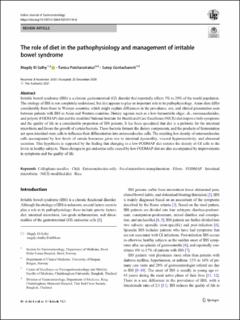| dc.contributor.author | El-Salhy, Magdy | |
| dc.contributor.author | Patcharatrakul, Tanisa | |
| dc.contributor.author | Gonlachanvit, Sutep | |
| dc.date.accessioned | 2021-08-10T07:03:54Z | |
| dc.date.available | 2021-08-10T07:03:54Z | |
| dc.date.created | 2021-04-08T14:48:47Z | |
| dc.date.issued | 2021 | |
| dc.identifier.issn | 0254-8860 | |
| dc.identifier.uri | https://hdl.handle.net/11250/2767096 | |
| dc.description.abstract | Irritable bowel syndrome (IBS) is a chronic gastrointestinal (GI) disorder that reportedly affects 5% to 20% of the world population. The etiology of IBS is not completely understood, but diet appears to play an important role in its pathophysiology. Asian diets differ considerably from those in Western countries, which might explain differences in the prevalence, sex, and clinical presentation seen between patients with IBS in Asian and Western countries. Dietary regimes such as a low-fermentable oligo-, di-, monosaccharides, and polyols (FODMAP) diet and the modified National Institute for Health and Care Excellence (NICE) diet improve both symptoms and the quality of life in a considerable proportion of IBS patients. It has been speculated that diet is a prebiotic for the intestinal microbiota and favors the growth of certain bacteria. These bacteria ferment the dietary components, and the products of fermentation act upon intestinal stem cells to influence their differentiation into enteroendocrine cells. The resulting low density of enteroendocrine cells accompanied by low levels of certain hormones gives rise to intestinal dysmotility, visceral hypersensitivity, and abnormal secretion. This hypothesis is supported by the finding that changing to a low-FODMAP diet restores the density of GI cells to the levels in healthy subjects. These changes in gut endocrine cells caused by low-FODMAP diet are also accompanied by improvements in symptoms and the quality of life. | en_US |
| dc.language.iso | eng | en_US |
| dc.rights | Navngivelse 4.0 Internasjonal | * |
| dc.rights.uri | http://creativecommons.org/licenses/by/4.0/deed.no | * |
| dc.title | The role of diet in the pathophysiology and management of irritable bowel syndrome | en_US |
| dc.type | Journal article | en_US |
| dc.type | Peer reviewed | en_US |
| dc.description.version | publishedVersion | en_US |
| dc.rights.holder | Copyright The Author(s) 2021 | en_US |
| cristin.ispublished | true | |
| cristin.fulltext | original | |
| cristin.qualitycode | 1 | |
| dc.identifier.doi | 10.1007/s12664-020-01144-6 | |
| dc.identifier.cristin | 1903017 | |
| dc.source.journal | Indian Journal of Gastroenterology | en_US |
| dc.source.pagenumber | 111-119 | en_US |
| dc.identifier.citation | Indian Journal of Gastroenterology. 2021, 40, 111-119. | en_US |
| dc.source.volume | 40 | en_US |

